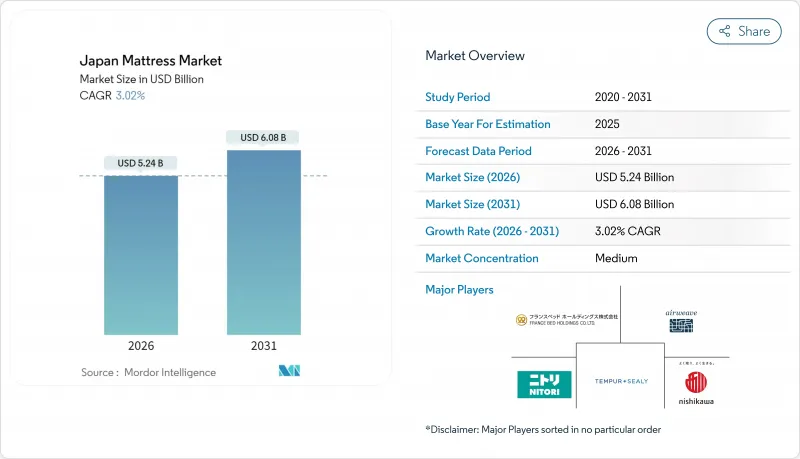
|
市場調査レポート
商品コード
1911290
日本のマットレス市場- シェア分析、業界動向と統計、成長予測(2026年~2031年)Japan Mattress - Market Share Analysis, Industry Trends & Statistics, Growth Forecasts (2026 - 2031) |
||||||
カスタマイズ可能
適宜更新あり
|
|||||||
| 日本のマットレス市場- シェア分析、業界動向と統計、成長予測(2026年~2031年) |
|
出版日: 2026年01月12日
発行: Mordor Intelligence
ページ情報: 英文 140 Pages
納期: 2~3営業日
|
概要
2026年の日本のマットレス市場規模は52億4,000万米ドルと推定され、2025年の50億9,000万米ドルから成長し、2031年には60億8,000万米ドルに達すると予測されています。
2026年から2031年にかけてのCAGRは3.02%となる見込みです。

この着実な拡大は、世界初の超高齢社会という日本の人口動態的現実、睡眠製品のプレミアム化、そして回復的な休息が労働生産性の基盤となるという企業側の認識拡大に支えられています。人口の29%を超える高齢層が圧力緩和技術の需要を押し上げる一方、eコマースの普及により、従来は店頭での試行が必要だったデータ豊富なカスタマイズされた購買体験が可能となりました。大阪・関西万博2025に伴う大規模なホテル設備更新は、家庭での買い替えサイクルを補完する並行的な商業需要の波を生み出しています。通貨安により輸入ラテックスのコストは上昇していますが、老舗ブランドは堅牢な供給網を保持しており、利益率への圧力を緩和しています。厳格なリサイクル規制により廃棄費用が上昇し、買い替えサイクルは長期化する一方、モジュール式でリサイクル可能な構造への設計転換も促進されています。これらの促進要因と摩擦要因が相まって、日本のマットレス市場は予測可能でありながら機会に富んだ軌道を確固たるものとしています。
日本のマットレス市場の動向と洞察
加齢人口の加速化が圧力緩和寝具を要求
日本のベビーブーム世代が75歳を超え、高齢者人口は約2,200万人に達し、医療レベルの圧力緩和ニーズが高まっています。医療費は2040年までに89兆円(6,054億米ドル)に達すると予測され、政策立案者は回復的な睡眠を予防医療の手段と位置付けています。損保ジャパンなどの保険会社は高齢者施設にAIセンサーを導入し、睡眠データを実践的なケア情報に変換しています。マットレスメーカーは高齢者向け人間工学とスマートモニタリングを組み合わせ、購入を任意支出から健康必須予算へ移行させています。日本の新たな医療機器ガイドラインに基づき製品を認証する企業は保険償還で優先され、寝具と医療の結びつきが強まっています。したがって人口動態の変化により、製品の訴求は快適性から臨床的に検証されたサポートへ転換し、プレミアム価格の上限が拡大しています。
家具・インテリア分野におけるeコマース浸透率の拡大
日本のBtoCオンライン売上高は2024年に24兆8,000億円(1,687億米ドル)に達し、9.23%の成長を記録。家具分野のデジタルシェアは前年比25%増加しました。AI駆動の3D可視化技術により、購入者は硬さを仮想的にテスト可能となり、ユーザーの51%が再利用を計画。バーチャルショールームが感覚的なギャップを埋められることを実証しています。D2C参入企業は小売店のマージンを排除し、動的価格設定を適用。その節約分を冷却フォームや防臭カバーの研究開発に注力しています。デジタルチャネルでは、価値提案が実物に触れる体験ではなく仕様書に基づくメモリーフォームやハイブリッドカテゴリーが有利です。物流パートナーは、狭いエレベーターにも対応する真空圧縮包装を改良し、人口密集都市における決定的なラストマイル課題を解決しています。大都市圏以外でも当日配送が拡大するにつれ、オンライン転換率が上昇し、日本のマットレス市場はショールーム中心からアルゴリズム主導へと移行しつつあります。
高騰する不動産コストが寝室サイズとキングサイズ需要を抑制
日本の平均住宅面積は92平方メートルまで縮小し、30年ぶりの低水準で大型ベッドの設置スペースを制限しています。都市部の新築ではマイクロアパートが主流となり、居住者はセミダブルマットレスや折り畳み式布団を選択せざるを得ません。同様の空間制約に直面するホテル業界では、歩行スペースを確保するため薄型マットレスを指定し、平均販売価格の上昇を抑制しています。各ブランドは巻き取り可能なコアやモジュール式構造で対応していますが、コンパクトなユニットでは材料使用量が減るため利益率は低下しています。小売店の展示品では、高さの代わりにベッド下収納を備えた収納ベッドのハイブリッドモデルが増加しており、デザインの優先順位が変化しています。したがって、スペース不足は、ユニット当たりの技術コストが上昇しているにもかかわらず、プレミアム製品の拡大に構造的な上限を課しています。
セグメント分析
スプリングマットレスは、硬めの寝心地を好む文化的傾向を背景に、2025年時点で日本のマットレス市場規模の46.72%のシェアを維持しました。メモリーフォームはCAGR7.72%を記録し、加齢層向けの圧力分散特性と、脊椎アライメントを重視する企業向けウェルネスプログラムの需要を享受しています。ラテックスはニッチ市場として継続していますが、円相場変動に伴う輸入コスト上昇に直面しつつも、環境配慮型世帯への訴求力で地位を守っています。ハイブリッドおよびエアファイバー設計は「その他」カテゴリーに位置し、アスリート層に人気の健康性能を訴求することで消費者選択肢をさらに多様化させています。昭和西川のAI駆動型フィッティング技術は、快適性に関する不確実性を低減することでフォームの台頭を支える技術の重要性を示しています。一方、スプリングは堅牢性を長寿命と結びつける価値重視層や多世代世帯において、依然として堅調な需要を維持しています。
病院ベッドや高齢者施設のアップグレードでは粘弾性層が主流となり、医療調達フローにメモリーフォームが深く浸透しています。スプリングメーカーは反発性を損なわずにフォームの体圧分散性を模倣するゾーンコイルで革新を図っていますが、鋼材コスト上昇による利益率圧迫に直面しています。小売業では現在、素材ではなく「睡眠効果」で商品を分類し、痛みの緩和を訴求するフォーム製品へ顧客を誘導しています。国内試験機関が発表した耐久性研究は初期のへたりに関する誤解を解き、フォームへの消費者信頼を高めています。この認識の変化により、フォームは信頼できる代替品としての地位を固め、人間工学の理解が広まるにつれ、さらなる成長機会を獲得する立場にあります。
その他の特典:
- エクセル形式の市場予測(ME)シート
- アナリストサポート(3ヶ月間)
よくあるご質問
目次
第1章 イントロダクション
- 調査の前提条件と市場の定義
- 調査範囲
第2章 調査手法
第3章 エグゼクティブサマリー
第4章 市場情勢
- 市場概要
- 市場促進要因
- 高齢化社会の加速化による圧力緩和機能付き寝具への需要増加
- 家具・インテリア分野におけるeコマースの浸透率上昇
- 大阪・関西万博2025を控え、ホテル改装ブームが到来
- 企業の「睡眠健康」プログラムによる大量調達の増加
- AI搭載3Dボディスキャニング小売体験によるプレミアムアップグレードの促進
- 急増する訪日観光客により、賃貸物件における布団からマットレスへの転換が進んでいます
- 市場抑制要因
- 高い不動産コストが寝室のサイズとキングサイズ需要を制限
- 価格に敏感なシニア層による買い替えサイクルの遅延
- 厳格なリサイクル法による廃棄処理費用の高騰
- 円相場変動下における輸入ラテックスへのサプライチェーン依存
- バリュー/サプライチェーン分析
- 規制情勢
- テクノロジーの展望
- ポーターのファイブフォース
- 新規参入業者の脅威
- 供給企業の交渉力
- 買い手の交渉力
- 代替品の脅威
- 競争企業間の敵対関係
第5章 市場規模と成長予測
- タイプ別
- スプリングマットレス
- メモリーフォームマットレス
- ラテックスマットレス
- その他マットレス
- 流通チャネル別
- オンライン
- オフライン
- エンドユーザー別
- 住宅用
- 商業用
- 地域別
- 北海道
- 東北
- 関東
- 中部
- 関西
- 中国
- 四国
- 九州・沖縄
第6章 競合情勢
- 市場集中度
- 戦略的動向
- 市場シェア分析
- 企業プロファイル
- Nishikawa Co., Ltd.
- France Bed Holdings Co., Ltd.
- Nitori Holdings Co., Ltd.
- Airweave Inc.
- Tempur Sealy Japan
- Showa Nishikawa Co., Ltd.
- Serta Simmons Bedding Japan
- Paramount Bed Holdings Co., Ltd.
- Tokyo Bed Co., Ltd.
- IDC Otsuka Furniture Co., Ltd.
- Koala Sleep Japan
- IKEA Japan K.K.
- Muji(Ryohin Keikaku Co., Ltd.)
- Sealy Japan Ltd.
- Magniflex Japan
- Nissin Medical Industries Co., Ltd.
- ASLEEP(Aisin Corp.)
- Simmons Japan Ltd.
- Korokoro Futon Works
- Nichias Bedding Solutions


